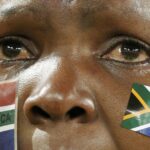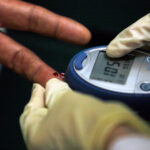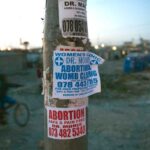Abused women from war-torn countries who have fled to SA for safety often face more maltreatment here.
Yvette Mbayo-Ndaya stands up from the small bench in front of her shop on Jules Street, downtown Johannesburg. A big truck rushes by as she walks past a stall of sweets and a container with amagwinya (vetkoek) into her shop.
Inside, she sits down and puts her feet on to a small yellow bucket. Then she lifts up her top and lowers her skirt, to reveal a deep scar running from her navel.
“It is going until down there,” she gestures towards her private parts.
Yvette is from the Democratic Republic of the Congo (DRC). In 2007, she was confronted by government soldiers at her home. They were looking for her husband. She told them she didn’t know where he was.
“They got very angry and just started burning me with a cigarette — you can see here,” she points at the black spots on her arms. “Then they started to rape me with a stick … they put it inside of me …” Her wailing cries drown out the rest of her sentence.
Her husband, hearing her screams, came out of hiding. They were tied up, beaten, stabbed and burnt. She was forced to look when the soldiers raped one of her daughters, who had been hiding in the house.
Yvette presses her hands over tight-shut eyes. She had been pregnant at the time of the attack and had a miscarriage as a result.
“People from Médecins Sans Frontières came and took me to the hospital where they operated on me. They took out the baby, who was damaged because of the sticks. She was in pieces.”
A passing truck muffles her cries.

Rape as a war tactic
Rape is often used as a war tactic to humiliate, instil fear or forcibly remove people. The Office of the United Nations High Commissioner for Human Rights dubbed the DRC “the epicentre of sexual violence against women today”.
In 2008 the UN Security Council adopted a resolution banning sexual violence as weapon of war. A 2014 report by the UN Joint Human Rights Office in the DRC states that rape and sexual violence are still a big problem; more than 3 600 cases were reported between January 2010 and December 2013. An estimated one in three of these rapes was committed by members of the DRC army.
Once she was discharged from the hospital, Yvette and her two daughters and youngest son fled to South Africa. The last time she saw her husband and two older sons was during the attack, when she was raped; they were taken away.
“I haven’t seen my husband and boys since then. I don’t even know if they are alive,” she says.
[WATCH] Close to death, but ‘no medication for foreigners’
Support for rape survivors
People who survive rape in a conflict setting “often face compounded traumas of rape, witnessing violence being inflicted on loved ones, and witnessing other large-scale indiscriminate atrocities”, says Kathleen Dey, head of the Rape Crisis Cape Town Trust, an organisation that offers counselling and court support services to rape survivors.
“Someone who has survived those experiences is deeply traumatised, but [they also] … face the uncertainly of finding a place to sleep, food to eat, protection for their children, and the fear of being confronted with xenophobic violence,” she says.
Separated from her immediate and extended family, Yvette is left to provide for and protect her three children and three grandchildren.
She’s struggling.
About three years ago, her second daughter was kidnapped in Johannesburg, held hostage and repeatedly raped by a man who worked just a few shops from hers. The man was caught and sentenced to 12 years in jail.
Xenophobic violence
In April 2015, Johannesburg was one of the cities hit by xenophobic violence. Yvette and her family sought refuge inside the shop with very little to protect themselves. An angry crowd broke the shop’s windows, but somehow the family remained physically unharmed.
“These women often require longer-term counselling particularly given that they have come to South Africa thinking that they are going to be safe and then get raped here. The idea that nowhere is safe is then firmly entrenched,” says Shiralee McDonald the counselling co-ordinator at the Rape Crisis Trust.
“Women who have experienced war rape have often been ripped from their families, witnessed their families murders and or rapes and experiences of isolation and alienation are deeply profound.”
Up until November last year, Yvette and her children were living in the confined space of her shop. Then someone offered to find a house for them to stay in and paid the rent for an entire year.
Yvette’s relief is, however, short-lived. In December she will have to take over the payment of the R3 500 rent for her house. Without a reliable income and six mouths to feed, she might have to bring her family back to the shop on Jules Street.
“I’m scared,” she says. “I don’t know what will happen in a few months. Will I be back to sleeping here? Will I be able to afford to pay rent for that house? I don’t know [what] I’m going to do.”

Help for refugees and asylum seekers
The only source of support Yvette has is Jesuit Refugee Services, an international Catholic organisation that helps refugees and asylum seekers get access to social services. The organisation pays for her children’s school fees and the home-based care workers visit her weekly to help manage her medical conditions.
Yvette has high blood pressure, diabetes and kidney failure. The home-based care-workers fetch her medication from the clinic and, when necessary, pay for it. At times they even give her money for food so that she doesn’t take her medicine on an empty stomach.
Admittedly, Yvette often used that money to cover the rent on her shop instead. “This shop is all I have and as you can see it’s empty,” she says, pointing at the bare shelves around her. “I have nothing. All I have is what you see outside. I can’t even afford rent for this space.”
Dey says one of the main difficulties her organisation faces when working with refugees is seeing to their physical needs, which are often more urgent than dealing with the effects of psychological trauma.
“These survivors require all-round support, but first and foremost, safety — their medical safety, physical safely and immediate psychological safety. Only when these basic needs are met would one begin to look at counselling for the trauma.”
Read our story about rape in Diepsloot.
This is the first of a three-part series on the lack of access to healthcare for refugees in South Africa. Read the second part here.
Priorities in a time of desperation
Some 115 000 refugees and 800 000 asylum seekers live in South Africa, according to the United Nations Refugee Agency. Although South African law affords refugees the right to work, freedom of movement and access to social services, the UN says “some public institutions do not recognise refugees’ permits, preventing them from benefiting fully from these rights”.
Kathleen Dey, of the Rape Crisis Cape Town Trust, says of primary concern to many of her clients is getting their documents in order. Without official documents legalising their stay in the country, it is difficult for refugees to become independent.
Dey says refugees’ ability to find and keep a job is further hampered by language barriers and “a high prevalence of post-traumatic stress disorder as a result of trauma faced both in their home countries and here in South Africa.
“Access to health care and police protection is compromised by language difficulties and xenophobic attitudes.”
Women who access the trust’s services are “not only dealing with the trauma of rape, but had more pressing basic needs such as not having a safe place to sleep or not having enough food,” she says.
Most of the refugee women who go to the trust are rape survivors from countries at war and need long-term counselling.
The trust’s Shiralee McDonald says: “These clients often suffer medical complications and appear to experience their trauma in bodily symptoms too.”
Ina Skosana was a health reporter at Bhekisisa.





